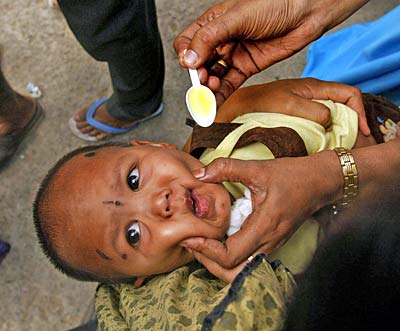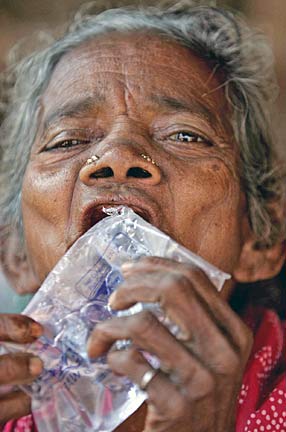
|
Red Cross seeks cash
to provide tsunami aid
The American Red Cross is urging people to donate cash so it can purchase relief items in the regions affected by the South Asia earthquake and tsunami disaster.
The Red Cross is unable to accept food, clothing or other in-kind donations. In past disasters, millions of pounds of donated clothing, food and medicine formed a backlog that actually hampered relief efforts, said Coralie Chun Matayoshi, chief executive of the Hawaii chapter of the American Red Cross.
Cash donations eliminate the added cost of shipping and transport from the United States, ensure that the items are culturally appropriate and help stimulate local economies.
Donors can call 800-HELP NOW or make a secure online donation at www.redcross.org. They can also send contributions to American Red Cross International Response Fund, P.O. Box 37243, Washington, DC 20013; or to the American Red Cross, Hawaii State Chapter, 4155 Diamond Head Road, Honolulu, HI 96816.
For further information, call 808-734-2101, option 8.
Anyone interested in becoming a local disaster volunteer for the Hawaii chapter can call Gail Higashi at 808-739-8113.
The Red Cross has also established a Web site to help people locate missing relatives at www.familylinks.icrc.org. Family members can search for names of missing relatives or post their name or the missing family member's name on the site.
www.eastwestcenter.org/events-en-detail.asp?news_ID=252
American Red Cross Hawaii
www.hawaiiredcross.org/
Red Cross survivor locator
www.familylinks.icrc.org
Pacific Tsunami Warning Center
www.prh.noaa.gov/ptwc/
U.S. Pacific Command
www.pacom.mil/

|
With thousands of lives
still at risk, a summit
focuses on tsunami
relief aid
JAKARTA, Indonesia » World leaders opened an emergency summit today with a moment of silence for the tens of thousands of tsunami victims before focusing on the best way to rush nearly $4 billion pledged worldwide to millions of survivors.
Secretary of State Colin Powell announced that the group of countries, including the United States, that led initial relief efforts will now turn over its work to the United Nations.
"The core group helped to catalyze the international response. Now having served its purpose, (it) will fold itself into the broader coordination efforts of the United Nations," Powell said.
U.N. Secretary-General Kofi Annan told the gathering that the world was in a race against time to get food, medicine and supplies to the neediest.
He said his organization continued to estimate that the final death toll will surpass 150,000 from the giant waves spawned by a 9.0 earthquake off Indonesia's northwest coast Dec. 26.
"Although we were powerless to stop the tsunami, together we have the power to stop those next waves," Annan said, calling for the establishment of a tsunami warning system in the Indian Ocean.
Annan appealed for $1.7 billion in disaster relief over the next six months for victims of the tsunamis, but it was not immediately clear if that plea included the previous pledges or was a request for more.
"There are daunting logistical constraints," Annan said, "but they are not insurmountable. It is a race against time."
Early today, a 6.2-magnitude aftershock centered close to the Sumatran provincial capital of Banda Aceh shook the city. Many residents fled into the streets fearing their homes might collapse, but there were no reports of fresh casualties. Hundreds of quakes have rattled the region since Dec. 26, but today's was among the strongest.
Yesterday, Powell and other summit participants got firsthand looks at the apocalyptic landscapes carved out by southern Asia's tsunamis.
Powell, a battle-hardened veteran of the Vietnam War, was aghast at the devastation on Indonesia's Sumatra island. "I've never seen anything like this," he said.
India has politely turned down the unprecedented offers of money and military might, but many Indonesians appeared to be putting pride aside: During Powell's visit, survivors expressed gratitude for American aid.
"Thank God he's come. Thank God," said Mohamed Bachid Madjid, peering from a bridge into the Aceh River.
The summit came just hours after some nations increased their pledges, bringing the worldwide total from governments to about $3.8 billion. Australia promised $810 million -- the largest so far -- topping a $674 million German package.
The fresh outpouring of generosity appeared at times to be almost like a bidding war and raised questions about whether rich nations were using tragedy to jockey for influence on the world stage and with hardest-hit Indonesia, which has a wealth of natural resources.
Louis Michel, the European commissioner for development and humanitarian aid, urged donors not to engage in one- upsmanship. "We have to be careful and not participate in a beauty contest where we are competing to give higher figures," he said.
Michel also said too many countries were making pledges that might not be honored.
A little more than a year ago, donors promised Iran more than $1 billion in relief after an earthquake killed 26,000 people there. Iranian officials say only $17.5 million has been sent.
The donors conference was focusing on how best to allocate the billions in aid following a disaster that wiped out villages and infrastructure, left millions homeless and threatened with disease, and killed more than 139,000 people. Leaders also were to discuss a warning system to prevent massive death tolls from future tsunamis.
www.eastwestcenter.org/events-en-detail.asp?news_ID=252
American Red Cross Hawaii
www.hawaiiredcross.org/
Red Cross survivor locator
www.familylinks.icrc.org
Pacific Tsunami Warning Center
www.prh.noaa.gov/ptwc/
U.S. Pacific Command
www.pacom.mil/
[News] [Business] [Features] [Sports] [Editorial] [Do It Electric!]
[Classified Ads] [Search] [Subscribe] [Info] [Letter to Editor]
[Feedback]
